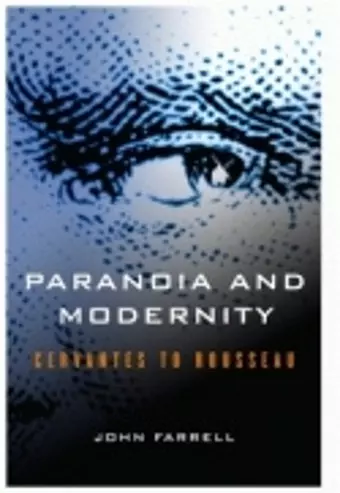Paranoia and Modernity
Cervantes to Rousseau
Format:Paperback
Publisher:Cornell University Press
Published:4th Oct '07
Should be back in stock very soon

"Don Quixote is the first great modern paranoid adventurer.... Grandiosity and persecution define the characters of Swift's Gulliver, Stendhal's Julien Sorel, Melville's Ahab, Dostoyevsky's Underground Man, Ibsen's Masterbuilder Solness, Strindberg's Captain (in The Father), Kafka's K., and Joyce's autobiographical hero Stephen Dedalus.... The all-encompassing conspiracy, very much in its original Rousseauvian cast, has become almost the normal way of representing society and its institutions since World War Two, giving impetus to heroic plots and counter-plots in a hundred films and in the novels of Burroughs, Heller, Ellison, Pynchon, Kesey, Mailer, DeLillo, and others."—from Paranoia and Modernity
Paranoia, suspicion, and control have preoccupied key Western intellectuals since the sixteenth century. Paranoia is a dominant concern in modern literature, and its peculiar constellation of symptoms—grandiosity, suspicion, unfounded hostility, delusions of persecution and conspiracy—are nearly obligatory psychological components of the modern hero.
How did paranoia come to the center of modern moral and intellectual consciousness? In Paranoia and Modernity, John Farrell brings literary criticism, psychology, and intellectual history to the attempt at an answer. He demonstrates the connection between paranoia and the long history of struggles over the question of agency—the extent to which we are free to act and responsible for our actions. He addresses a wide range of major authors from the late Middle Ages to the eighteenth century, among them Luther, Bacon, Cervantes, Descartes, Hobbes, Pascal, La Rochefoucauld, Swift, and Rousseau. Farrell shows how differently paranoid psychology looks at different historical junctures with different models of agency, and in the epilogue, "Paranoia and Postmodernism," he draws the implications for recent critical debates in the humanities.
This ambitious book traces the workings of paranoia through a dizzying variety of texts, not only 'Cervantes to Rousseau,' but Sophocles to Pynchon, including detailed readings of the Gawain Poet, Luther, Bacon, Descartes, Hobbes, Pascal, Leibniz, Locke, Pope, Swift, and Hemingway.
* Renaissance Quarter- Winner of A 2006 Choice Magazine "Outstanding Academic Title.
ISBN: 9780801474064
Dimensions: 235mm x 155mm x 24mm
Weight: 907g
352 pages